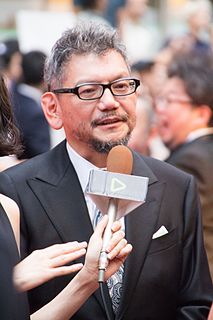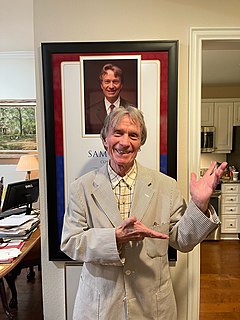A Quote by Catherine Hardwicke
As a director, when you cut scenes from a movie, you do it with the idea that it is making the story move forward and progress. Sometimes, you don't realize that something is actually a sidetrack for the story, or it takes the tension out of a scene.
Related Quotes
Eva is a story of repetition. It is a story where our protagonist faces the same situation many times over and determinedly picks himself back up again. It is a story of the will to move forward, even if only a little. It is a story of the resolve to want to be together, even though it is frightening to have contact with others and endure ambiguous loneliness. I would be most gratified if you found enjoyment in these four parts as it takes the same story and metamorphoses it into something different.
Sometimes, a scene goes on too long and, with this being a suspense story and murder mystery that you're trying to discover through her heightened paranoia, you don't want scenes that take you on a tangent. Sometimes, you love those scenes, but you know that it's better not to be in the overall film. So, I'm not sad that they're not in the main movie, but I do think it's fun for people to get to watch them, if they want to.
The story of the entrepreneur... is the story of forward progress, of pursuing one's dreams and goals no matter how outlandish they seem to others. The entrepreneur, like the pioneer, pushes boundaries in search of what's new, what's next. Sometimes, he brings the whole society with him, rushing forward together into a next phase of our communal human life.
If you're a certain type of actor, then eventually stepping into a director's shoes is a natural transition. I've always been the actor who's very focused on the narrative, where my character is in the story, and how I can benefit the story. I've always had a technical aspect of what the lens is, how the camera is going to move, how I can feed the information the director applies within that move. If you're that type of actor, narrative-based, technically proficient, the next step is actually not that far.
I don't particularly like the idea that there's an arc to the story and that therefore in this scene you have to convey this bit of information or emotion. I like more the feeling that, of course, there is a shape to the story, but that each scene should feel right, should be true at that moment, and that gradually you accumulate these moments of truth until you get enough of them together that it becomes a story that's interesting.
The one good thing about a movie and music and stuff like that: Sometimes it's a counterpoint between the movie and the music itself, the difference and the tension they build together. I think that could be something that helped with me, because when I write songs now, I write lyrics a bit like that. I try to make the music be an interesting twist on the lyrics and help tell the story in a - I don't tell crazy stories, you know? So a lot of times, the twist is in the subtleties. The twist is in the way the story's told.



































